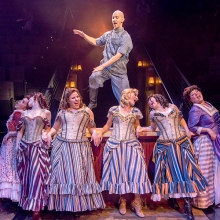Full Synopsis
Full Synopsis
Act One
Geoffrey Chaucer introduces himself to the audience and tells us of a spring evening as he and a crowd of fellow pilgrims dined and rejoiced in an inn before making their way to Canterbury.
The Innkeeper welcomes the crowd and wishes them all well on their journey, offering them food and drink ("Welcome Song"). Once everyone has settled in, the Innkeeper makes a deal with everyone: they will all tell a tale on the way to Canterbury, and whomever tells the best tale will get a free supper upon returning to the inn after the pilgrimage. He will be the judge and will go with them on the journey as a guide. All agree to the challenge and then go to bed for the night. Early the next morning, the Innkeeper awakens them all and gets them on their way. All are excited, whether they are going to pray or to see the countryside and visit pubs ("Canterbury Day").
As the scene begins, the Knight has just finished his tale and all are pleased with it. He seems like a noble and wise man. The host then asks the Priest to tell a holy tale. Just as he is to begin, the Miller comes in, drunk and rowdy. He interrupts the tale, claiming that he knows a funny, rude tale to tell. Everyone tries to contain him, including the Steward. But the Miller threatens the Steward, explaining that they had a fight and were sent on this pilgrimage to make amends with one another, but he does not wish to do such a thing. Despite some protest, the Miller begins to tell his tale. Chaucer appears and overlaps with him, apologizing for the tale that is about to be told. He explains that the Miller, as well as many others here, were not upper class people, and the only tales that they knew were bawdy, but it is Chaucer's job to recite the tales as they were told on that journey.
The Miller tells his tale: There was a rich old carpenter in Oxford who took on a lodger: a young student who turned his affections to astrology and geomancy. He was very musical and had a talent for making love in secret. His name was Nicholas the Gallant. He appears and sings a song about his noble rooster, a song that is rich with sexual innuendos ("I Have a Noble Cock"). The Carpenter had recently married a young wife, Alison, who was beautiful and provocative. Nicholas wanted to make love to her, but she would not have him. He pleaded with her and, finally, came up with a plan that convinced her. She warned him that her husband was very jealous and, if he should find out that anything happened between them, he would kill her. Nicholas told Alison to bring two days worth of food and drink to his room and that she would say to her husband that she had not seen him.
Alison then went off to church, where she ran into a clerk named Absalon who was in lust with her, as well. Whenever Absalon came around for collections, he would not take Alison's money. Later that night, he set out with his guitar and ended up at Alison's home. She and the carpenter were in bed, but Absalon sang outside their wall, anyway. He sang a song, asking to teach her how to kiss, claiming to be a master of it and professing to be able to teach her, letting her know what bliss is ("Let Me Teach You How to Kiss"). However, Absalon knew that Alison wanted Nicholas and not him. Nicholas carried on with his plan: He stayed in his room, and the carpenter thought that he must be ill. He went to check on him and found him in a trance. Nicholas broke out of the trance and warned the Carpenter that he had seen terrible news in the stars. That night, there was to be a flood worse than that in the time of Noah, and all would drown.
As expected, the Carpenter worried about his wife and himself. Nicholas told him to go gather three troughs, one for each of them, and to hide them so that they could float in these troughs and be the only ones to survive. He sent the Carpenter off and also warned that the Carpenter must not be with his wife that night because, if they are to be saved, there must be no sin that night. The Carpenter ran off to do the job that he was given. Alison and Nicholas took a moment in anticipation of their union ("Noah's Flood") as the Carpenter completed the task. The three of them hung the troughs and said their prayers ("Pater Noster"). The Carpenter climbed into his trough and went to sleep. Nicholas assured him that he would yell and wake him when the water was nearing. Nicholas and Alison removed the ladder from beneath the Carpenter's trough as he slept and rushed off together.
The next morning, before it was even light out, Absalon came before Alison's window and stood outside, professing his love for her. Alison came outside, trying to get him to leave, but he insisted that she must kiss him once. She agreed and, in the dark, stuck her butt out of the window as Absalon kissed it. He was furious and, hearing Nicholas laughing inside, swore that he would get revenge. Absalon got a hot iron and went back to Alison's home, saying that he had a ring for her. This time, Nicholas stuck his rump out and Absalon struck him with the hot iron. Nicholas yelled for water and, upon hearing this, the Carpenter woke up and cut the rope of his through, thinking that the flood had come, falling to the floor and screaming. The Miller has now finished his story.
Some have enjoyed the tale more than others. The Wife of Bath says that her name is Alison and that she, too, once was very pretty and had a way with men. She tells of how she has traveled all over and has found her own special treats everywhere that she has gone ("It Depends on What You're At"). The crowd then turns their attention to the Prioress, who wears a coral and gold bracelet that is engraved with the words, "Love will conquer all." She sings a song of how the devil tried to lead people into the seven deadly sins, and the only way to stay safe is to follow love ("Love Will Conquer All").
The group is now at an alehouse at the end of their first day. Chaucer appears to summarize that some bawdy tales – and some that are more wholesome – were heard that day. We see that new acquaintances have begun to form among the pilgrims. Two new characters have appeared: a Summoner and a Pardoner. They begin to mingle with the crowd, and the Wife of Bath tells them how she has been married five times. The crowd gets excited, and the Miller and the Steward begin to fight again. The Steward insists that it is time now for him to tell his tale in response to the Miller's.
The Steward begins his tale: A Miller, who was a thief of corn and meal, had a wife and a 22-year-old daughter. Two students knew of his thieving ways and set out to catch him. The students borrowed the Warden's horse and put their corn on its back; if they caught the Miller trying to steal the corn, they would beat him. They presented the corn to the Miller and asked him to grind it. He asked what they would do while he did the job. They replied innocently that they wished to watch. The Miller was on to them and knew they were trying to trick him. So, as the two students were in the mill, the Miller went out and set their horse free. He did the job as they watched, and they were pleased that they had succeeded in keeping him from stealing. They went out to load the bag back onto the horse, only to find that it was gone. They ran off to find the horse, leaving the bag of cornmeal. The Miller helped himself to some of the corn, pleased that he had won.
It was night by the time the students captured the horse, and they now had to spend the night at the home of the Miller. Outside, they saw that some of their corn had been pilfered and they entered the house to ask for a room. The Miller said that they didn't have one but that they could all share the space. The Miller feigned pity for the boys, mocking them for being wise students but not knowing how to tie a horse. They all drank that night and the students got the family very drunk. They all then went to bed: the family first, and then the students. One student decided that he would go and sleep with the Miller's daughter. Since his corn had been stolen, it was the least he could do.
The other student, thinking that, if the other student had claimed a prize, he would be considered the loser, set out for the Miller's wife. The Miller's Wife got up to relieve herself in the middle of the night, and the second student switched things around so that she thought that she was getting into her own bed, when it was indeed the student's. In the morning, the daughter told the first student where he would find a cake made of the stolen cornmeal. The student rose from bed to return to his own, only to climb into bed with the Miller, thinking that he was in bed with his friend. The student confessed what he had done all night with the daughter, and the Miller flew into a rage. Chaos ensued, and, in the dark, the wife ended up beating the Miller with a broom.
The score is now even between the Steward and the Miller. The group mounts its horses and continues on its pilgrimage.
Act Two
The Pilgrims have stopped for a midday rest at a local inn. The Wife of Bath sings of how she has been married five times before and how she could do with a dozen more husbands ("Come on and Marry Me, Honey"). The Miller is drunk again, and the Steward gives him some wine to calm him down. It does the trick, and the Miller tells the Steward that, although he will never forgive, he will forget. They hug, seeming to have made up somewhat. Many of the pilgrims wish to hear more of the tales of the Wife of Bath's many husbands, and she happily obliges. She tells them the story of her fifth husband, whom she first saw at the funeral of her fourth husband. She loved her fifth husband very much and left all of her money to him.
One night, she was angry that he was not paying attention to her and so she ripped some pages from a book that he was reading. Angered, he struck her hard, and she fell to the floor. When she woke up, she called out for him and, when he came back, she hit him. The couple had their problems but they were good to each other and so they stayed together. The Wife of Bath does not finish her story, though, and says that they will have to wait to hear the rest of it later. The debate continues as to if a woman should rule over her husband or if she should be obedient ("Where Are the Girls of Yesterday?").
The Merchant, who is a newlywed, speaks up and is ready to tell his tale: There was a 60-year-old Knight who was still a bachelor but very much wanted to be married. The Knight, January, sent his squire, Damian, to fetch two friends. Damian brought back Lord Placebo and his friend Justinus. January told the two men that he wanted an heir and, therefore, must find a wife. January specified that she must be a young virgin. Justinus questioned January as to whether or not he is fit, to which January assured them that he is. Placebo encouraged him, while Justinus discouraged him.
January had found a lovely virgin, May, but was told that there was no such thing as bliss on both Earth and in Heaven. If he had one, he must bypass the other. January wondered if it was worth it, but decided to marry May, anyway. Their wedding night came, and January could not wait to consummate their marriage. He drank a bit of his aphrodisiac and prepared to make love to his wife ("If She Has Never Loved Before"). Damian, however, could not control himself when he saw May's beauty and he literally became sick. That night, May went through the motions with January but did not feel for him as he did for her. The next morning, January inquired as to where Damian was and was told that he was sick. January sent his wife to look in on the sick servant. That night, Damian had written May a love poem, and, when she approached him, he professed his love to her and gave her the poem ("I'll Give My Love a Ring"). May decided that she would requite his love, even though they must figure out the time and place. Damian sprung up, suddenly feeling well and ready to win her love.
January had a walled, secret garden to which only he had the key. Pluto and Prosperina often walked in there. They would argue about who was worse: men or women. May had taken the key and made an impression of it in warm wax and gave it to Damian. One day, quite suddenly, January went blind. He could not see what his wife was doing and only felt secure when she was holding his hand. He insisted that, should he die, May must remain a widow in mourning. She insisted that she already was. Then, Damian came in and, since January could not see him, he kissed May. Pluto and Prosperina watched the scene as Damian and May blew kisses to each other and January kissed May's neck. Pluto insisted that, to repay the lecherous behavior, he would give January his sight back and that the first thing that he would see was his wife and servant being adulterous.
Prosperina told May of Pluto's plan and gave May a pre-written excuse for the situation. May then told January that she had a craving for a pear, and so she had him boost her into the tree where Damian was already hiding, and they began to make love in the tree. As Pluto saw this, he gave January his sight back. As soon as May knew that she was caught, she burst forth with her excuse: She knew that he would get his sight back if she were to struggle with a man in a tree. She only did it for his sake, so that he could see again. January insisted that it was no struggle, and she insisted that he must not be seeing right. She pleaded and cried and convinced him to forgive what he saw. The story ends with the men and women all pleading their side to one another ("Pear Tree Quintet").
Three days have passed on the journey, and, while the Wife of Bath has certainly said her share on marriage and men, she has not actually told a tale. On the fourth day, the Squire sings a song about his lady, which launches the Wife of Bath into her actual tale ("I Am All Ablaze").
King Arthur reigned over his court. He had a Knight there who had been deflowering virgins, and Arthur considered this an unpardonable crime. Arthur felt that this man must be put to death. The Queen argued that he was too young to die, and The Knight joined in and insisted that, while he may have been to blame, so was she: when a woman's body calls to a man, how could he resist? The Queen felt that she saw the truth in this boy and wished to send him on a quest for truth – He must solve a riddle: "What is it that women most desire?" He had a year and a day to solve it and then come to her with a satisfactory answer.
Every woman the Knight encountered, though, had a different answer to the riddle, and it all seemed hopeless. On his last day, the Knight encountered an old hag who promised that, if he did what she asked of him, she would give him and the Queen the answer that they desired. He gave the Queen the answer that a woman simply desires that her husband love and obey her completely, which was indeed the answer that she had wanted. The Old Hag made her request then, explaining to the King and Queen the terms that she set out. What she wished of the Knight was to be his wife. The Knight pleaded and argued that he could not marry an old hag and that he would do anything else. The king warned the Knight that he would wed the hag or die, so the two were wed.
The Knight could not bring himself to even look at her, and she lectured him on the virtues that he lacked. She gave him a choice: He could have her old and ugly... but loyal until she died, or he could have her young and beautiful... and what may happen, no one would know. He remembered the lesson that he learned and told her that, whatever it was that she wanted, he wanted, too. She told him that he had learned well and he would have both. She turned into a beautiful young woman and was loyal for their entire life.
The group has now arrived at Canterbury, and the Host asks the Knight one last time who should rule: a woman or a man. The Knight eloquently states that love's great paradox is that both men and women want some freedom and some obedience; it is give and take. The Priest then leads them in a prayer to end their journey ("Love Will Conquer All – Reprise").
Inside the Cathedral, all file past the altar. Chaucer address the audience, telling them that, if they enjoyed any part of the story, to thank God for it. If they did not like any part, to forgive him, for he is just the storyteller and he did the best he was able.




